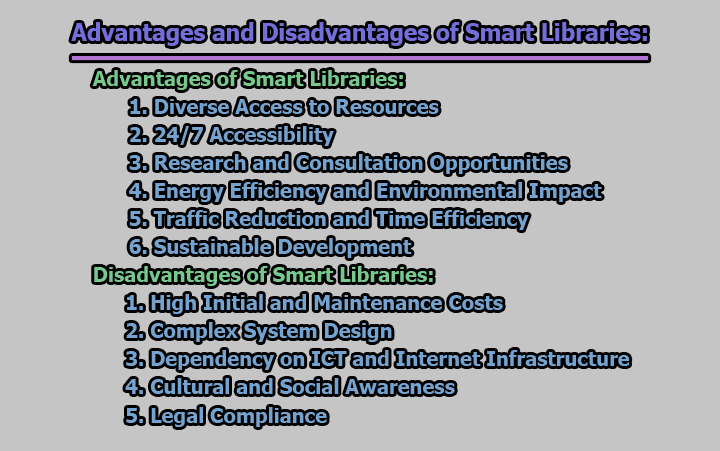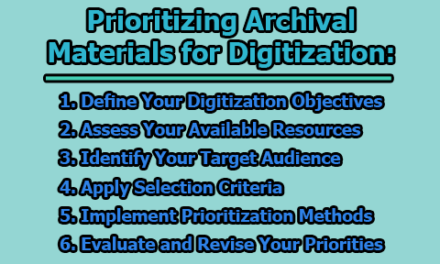Advantages and Disadvantages of Smart Libraries:
In the ever-evolving landscape of information and technology, libraries have undergone a significant transformation, giving rise to the concept of smart libraries. Smart libraries leverage advanced technologies to enhance their services and provide users with a seamless experience. Here, we will explore some of the advantages and disadvantages of smart libraries.
Advantages of Smart Libraries:
Smart libraries represent a paradigm shift in the way libraries operate and provide services, offering a host of advantages that cater to the evolving needs of information seekers and researchers. Here are the essential advantages associated with smart libraries:
1. Diverse Access to Resources: Smart libraries seamlessly integrate traditional and modern sources of information. They provide users with access to an extensive collection of resources, including books, periodicals, journals, and literary sources, in both paper and electronic formats. This diversification ensures that users have a wealth of information at their fingertips, catering to various learning preferences and research needs.
2. 24/7 Accessibility: One of the standout features of smart libraries is their ability to provide services around the clock. Unlike traditional libraries with fixed operating hours, smart libraries break down time constraints, allowing users to access resources and services at any time. This perpetual accessibility enhances the user experience, accommodating the diverse schedules of students, researchers, and enthusiasts.
3. Research and Consultation Opportunities: Smart libraries play a pivotal role in fostering scientific research by offering valuable resources and expert consultations to clients. Researchers benefit from the ability to explore rare and specialized sources, and smart libraries often facilitate access to important websites linked to major and renowned libraries. This opens up new avenues for collaboration and knowledge exchange.
4. Energy Efficiency and Environmental Impact: Embracing technology, smart libraries contribute to environmental sustainability. By reducing the reliance on physical infrastructure, such as printed materials and energy-consuming systems, these libraries help minimize energy consumption, environmental pollution, and harmful emissions. Digital resources and optimized systems align with eco-friendly practices, making smart libraries environmentally conscious institutions.
5. Traffic Reduction and Time Efficiency: Smart libraries significantly contribute to the reduction of traffic congestion and time wastage associated with physical visits. Remote access to information and services mitigates the need for individuals to travel to a physical library location. This not only saves time for library-goers but also contributes to a more efficient use of resources, as fewer people are physically present at the library.
6. Sustainable Development: Beyond individual benefits, smart libraries actively participate in fostering sustainable development practices. Their adoption of digital technologies and eco-friendly practices contributes to a greener approach to information dissemination. By reducing the demand for physical materials and optimizing resource use, smart libraries align themselves with global efforts to build a sustainable future.
Disadvantages of Smart Libraries:
While smart libraries offer several advantages, it’s essential to acknowledge the potential drawbacks and challenges associated with their implementation. Here are some of the disadvantages of smart libraries:
1. High Initial and Maintenance Costs: One of the primary challenges faced by institutions adopting smart libraries is the substantial upfront cost of implementation. The integration of cutting-edge technologies, infrastructure development, and system design require significant financial investments. Additionally, ongoing maintenance costs, including updates and system improvements, can strain the financial resources of libraries, particularly those with limited budgets.
2. Complex System Design: Designing and maintaining smart library systems demand specialized knowledge and expertise. The complexity of integrating various technologies, ensuring compatibility, and addressing potential technical issues poses challenges for library staff. Institutions without dedicated IT support may find it difficult to navigate the intricacies of system design and maintenance.
3. Dependency on ICT and Internet Infrastructure: The success of smart libraries relies heavily on a robust Information and Communication Technology (ICT) infrastructure. Libraries must invest in high-speed internet, reliable servers, and cybersecurity measures to ensure seamless operations. In regions with inadequate ICT infrastructure, achieving the desired level of functionality becomes a significant hurdle, limiting the accessibility and effectiveness of smart libraries.
4. Cultural and Social Awareness: Smart libraries require users to possess a high level of technological literacy and cultural awareness. In regions or communities where access to technology is limited, or where there’s a lack of familiarity with digital platforms, users may struggle to take full advantage of the services offered by smart libraries. Bridging this digital divide is essential for ensuring inclusivity and equal access to information.
5. Legal Compliance: Smart libraries must navigate local legislation and laws to ensure that their operations comply with legal requirements. This includes issues related to data privacy, copyright, and intellectual property. Adhering to these regulations can be a complex task, and failure to do so may result in legal consequences, limiting the scope of services that smart libraries can provide.
In conclusion, while smart libraries offer a plethora of advantages, it is crucial to acknowledge the challenges associated with their implementation. Institutions must carefully weigh the benefits against the disadvantages and consider the long-term sustainability and adaptability of smart library systems. As technology continues to advance, smart libraries remain a promising avenue for providing enhanced and efficient library services in the digital age.

Library Lecturer at Nurul Amin Degree College










